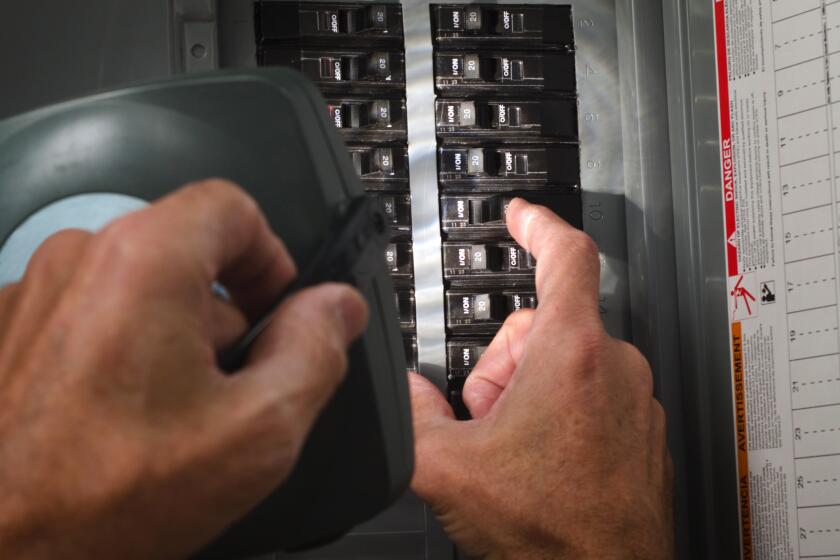What’s in a Name? Sometimes a Big Mouthful : Couples Reach a Variety of Compromises on Joining Handles in Marriage
Edwina Sewell-Baverstock, librarian with the British Consulate General in Los Angeles, remembered the day nearly 30 years ago when she arrived in the United States with three steamer trucks engraved with her initials. Two bore the initials E S - B and one E I for her stage name, Edwina Iredale. Officials sorted the trucks alphabetically, one under S , another under B and another under I . “I said, ‘Oh, dear,’ ” Sewell-Baverstock recalled.
In Sewell-Baverstock’s native England, hyphenation is customary when the mother’s family property and inheritance are involved. And Sewell-Baverstock, like some other Europeans whose names have been hyphenated since birth, had learned to adjust to the headaches. After all, she had no choice.
The Women’s Movement
But since the women’s movement of the ‘70s, more Americans have chosen--despite social and bureaucratic confusion--to hyphenate their surnames with those of their spouses.
While the vast majority of American brides still take their husband’s last names, 10% of newlyweds now either keep their separate names or create a new hyphenated name to share, estimates Andrew Cherlin, an assistant professor of social relations at Johns Hopkins University who informally researched the topic a few years ago.
Linda Lifur-Bennett, a Fullerton psychologist, said she did it to preserve an established professional identity when she married Ron Bennett six years ago.
Rosemary Pegueros-Lev of Sunland, action coordinator for the California National Organization for Women, said she wanted to show pride in her Latino heritage when she married Yehuda Lev.
Teresa Myers-Edwards, an Orange County court reporter, wanted to hold on to her maiden name, Myers, as a sign of independence.
On the other hand, Vance Merrill-Corum, Steve Wright-Deitelbaum, Jay BloomBecker and Jerry Freedman Habush, husbands who now share their wives’ maiden names, say they did it to make social, political and/or personal statements in support of feminism.
Women, they say, love it. “My wife’s female friends get really gurgly about it,” said Freedman Habush, 42, director of the Hollywood-Los Feliz Jewish Community Center.
He said he hyphenated his name, Habush, with his wife’s name, Freedman, when they married 12 years ago. But after seven years, he dropped the hyphen, still keeping his wife’s name as part of his last name. Too often, he said, people could not pronounce it, got “sloppy” and just dropped the Habush. “They called me Freedman and that’s not my name. I had a problem with that.”
Also, he said, he would sometimes receive mail at work addressed to Jerry Freedman, Habush--as if Habush were his job title.
Jay BloomBecker, a Los Angeles computer crime specialist, said he and his wife Linda, a psychotherapist, experimented with several permutations of their combined surnames before they married five years ago. He said they considered Becker Bloom, Blecker and Bloomer before settling on BloomBecker(“capital B no space no dash”).
“A capital is easier than a hyphen,” BloomBecker said, “and really amalgamates our names into one.”
Married in Kyoto
Then there is Alan Yamazaki, associate professor of English at Orange Coast College in Costa Mesa, who legally changed his surname from the French-Canadian Gauley when he married Takako Yamazaki in Kyoto seven years ago.
He said his reasons were more pro-tradition than feminist: If he had not changed his name, and passed it on to their children, there would have been no one to carry on the family name Yamazaki.
It is Japanese custom, he said, for the husband to take the wife’s family name if he is marrying into a family with no men to carry on that name.
The blond, blue-eyed Yamazaki said his name has elicited a variety of responses from “Are you Polish?” to hate mail.
But husbands who take their wives’ names in any form are rare. Dual-name wives explain their single-name husbands like this: “The break with tradition would have been difficult for him”; “My husband is a well-known figure . . . There was never any question he would change his name”; “We never discussed it. I thought I might be pushing my luck.”
Lifur-Bennett said her husband asked her such questions as, “Aren’t you proud to be my wife?” and “Do I have to give up my own name to adopt yours?” when she said she wanted to keep her maiden name. It took hours of lively discussion, which included the possibility of getting rid of the name Bennett, to reach a compromise decision, said Lifur-Bennett.
Because people are unsure what to call her, Lifur-Bennett has created an intricate system of names to suit the occasion. For instance, she uses the hyphenated name for speaking engagements, a plain Dr. Bennett for clients who are having a hard enough time struggling with reality, and Linda Bennett when she’s out socially with her husband, Ron, assistant superintendent of schools in Fullerton. To make matters less complicated for her son, Brandon, she said, he has Lifur as a middle name and Bennett as a last name with no hyphen.
Changed His Name
After Vance Merrill-Corum, 32, changed his name when he married Sue Merrill three years ago, he notified the IRS, the Social Security Administration, his banks and all the people with whom he works. Nevertheless, most of his mail continues to arrive addressed to Vance Corum, said Merrill-Corum, who is direct marketing specialist for the California Department of Food and Agriculture. The Merrill-Corums live in Los Angles.
UCLA graduate student Steve Wright-Deitelbaum, however, said his new name is too long for almost everyone. Telephone operators call him Writelbaum. One credit card lists him as S. Wright-Deitelbaum, another as Steve Wright Deitelbaum (no hyphen) and on his social security card as Steve W. Deitelbaum, despite two trips to the local office to explain the name.
Legally, anyone (without fraudulent intentions) can change his or her name by simply requesting the change on documents such as drivers’ licenses or credit cards. Some go through Probate Court, however, if they want to amend their birth certificates (to apply for a passport in the new name, for example).
However, the Internal Revenue Service often delays tax refunds when the primary name on a couple’s tax form does not match up with his or her social security number. To change names with the Social Security Administration, both male and female applicants need to show the original marriage license or certified copy with both the new name and the old name, said a spokesman.
The Department of Motor Vehicles will type in any name a person wants, said Jim Coffin, a program technician with the DMV in Sacramento.
But he believes choosing a hyphenated name is “the dumbest thing you can do.” Since the computer does not recognize punctuation marks, a name like Fox-Jones would appear Foxjones and be filed under the F’s. If Fox-Jones comes in saying his or her name is Jones, then “everybody is looking under J.”
Hyphenated people report their names embarrass people. They are often asked if they are English or Latino. They need to repeat and spell their names endlessly for secretaries when leaving telephone messages.
Rosemary Pegueros-Lev, who is Latino by ethnicity but Jewish by religion, said a man named Smith once told her that her name sounded like “something from outer space.” Another time she was asked to spell her name 14 times. And one caller asked for Rosy Spaghetti. “And he was serious.”
There are other problems, such as which name to list in the telephone book, what to do with a dual name in the event of divorce, how to deal with parents who don’t understand, and--what has been called the “bottom line” issue for dual-name couples--What To Name The Children.
“My answer is they’ll choose their name the same as we chose ours. If they choose to marry,” said Merrill-Corum, who does not yet have children.
Wright-Deitelbaum said he and his wife, Dianne, who have no children yet, have considered giving their children the hyphenated name. The child would keep the hyphenated name until marrying; then a son would drop his mother’s half of the name, Wright, and a daughter would drop her father’s half, Deitelbaum. That way the woman’s name would be passed on through the daughters, and the man’s would be passed on through the sons.
“Our kids may say, ‘What did you give us all this grief for?’ and just change it. Which would be fine,” he said.
According to Johns Hopkins professor Cherlin, the most common new convention is for the wife to keep her maiden name as a middle name and give the husband’s name to the children. Pegueros-Lev said her 5-year-old daughter’s name is Lev because she did not want to burden her with the difficult spelling and pronunciation in school.
In Latino cultures, children are named through a patriarchal system. Each child receives a name from both parents. However, the child inherits only the names of the grandfathers from each parent, Cherlin said, and the patriarchal grandfather’s name comes first in the sequence. (For example, a woman named Lopez-Gonzalez would pass on only her father’s name, Lopez, to her child. If her husband were named Mendez-Salazar, he would pass on his father’s name, Mendez, and the child’s last name would be Mendez-Lopez.)
Another system proposed by Anthony Weston, a philosophy professor at Vassar, recommends couples choose a common middle name, which would be passed on to the children as their last name.
“Presumably it would be a name which has some symbolic meaning for them, which sounds nice with their other names, and so forth,” Weston explains in The CoEvolution Quarterly. “Suppose Ann Smith and Oren Jones treasure a certain woods: Ann Smith might become, say, Ann Oakwood Smith; Oren Jones correspondingly becomes Oren Oakwood Jones . . . Suppose Ann and Oren have a daughter named Adrian; her full name would be Adrian Oakwood.”
In her book, “Miss Manners’ Guide to Excruciatingly Correct Behavior,” Judith Martin advises parents to think of the child’s subsequent initials so that they will not end up looking like a government agency.
Martin also advocates an ancient custom of passing on only the mother’s name to the children because “the basic family unit has now become the mother and children of whom she has been awarded custody.” It is simpler, she says, if they all have the same name and keep it, “no matter who happens to join them later.”
Indeed, a Long Beach couple, Maureen McHale and Mike Sallwasser, have done just that. While keeping separate names, they have given McHale as a last name to their two children: Matthew, 3, and Kelly, 15 months. “Names are usually given in a patriarchal manner, the father to the children, and the mother is not a significant character, so we decided to do the opposite,” said McHale, 30, a graphic designer.
Besides, she said, “My name is so much nicer than Michael’s. No one ever spells Sallwasser right.”
Their radical statement, however, is rarely noticed, she said. “In this society no one cares. With so many divorced parents, everyone’s name is different from their parents anyway.”
More to Read
Sign up for Essential California
The most important California stories and recommendations in your inbox every morning.
You may occasionally receive promotional content from the Los Angeles Times.






